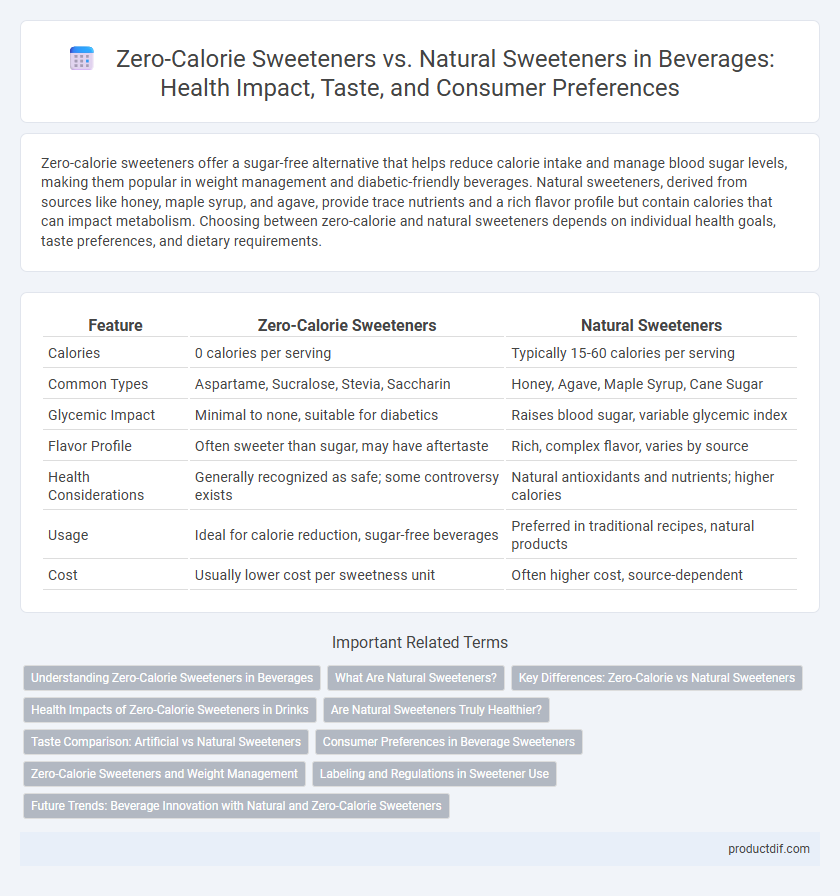Zero-calorie sweeteners offer a sugar-free alternative that helps reduce calorie intake and manage blood sugar levels, making them popular in weight management and diabetic-friendly beverages. Natural sweeteners, derived from sources like honey, maple syrup, and agave, provide trace nutrients and a rich flavor profile but contain calories that can impact metabolism. Choosing between zero-calorie and natural sweeteners depends on individual health goals, taste preferences, and dietary requirements.
Table of Comparison
| Feature | Zero-Calorie Sweeteners | Natural Sweeteners |
|---|---|---|
| Calories | 0 calories per serving | Typically 15-60 calories per serving |
| Common Types | Aspartame, Sucralose, Stevia, Saccharin | Honey, Agave, Maple Syrup, Cane Sugar |
| Glycemic Impact | Minimal to none, suitable for diabetics | Raises blood sugar, variable glycemic index |
| Flavor Profile | Often sweeter than sugar, may have aftertaste | Rich, complex flavor, varies by source |
| Health Considerations | Generally recognized as safe; some controversy exists | Natural antioxidants and nutrients; higher calories |
| Usage | Ideal for calorie reduction, sugar-free beverages | Preferred in traditional recipes, natural products |
| Cost | Usually lower cost per sweetness unit | Often higher cost, source-dependent |
Understanding Zero-Calorie Sweeteners in Beverages
Zero-calorie sweeteners, such as sucralose, aspartame, and stevia, are widely used in beverages to provide sweetness without adding calories or raising blood sugar levels. These sweeteners enhance flavor while supporting weight management and diabetic-friendly diets, making them a popular alternative to sugar in diet sodas and flavored waters. Understanding the different types and their metabolic effects helps consumers make informed choices about beverage consumption.
What Are Natural Sweeteners?
Natural sweeteners are derived from plant sources such as fruits, honey, maple syrup, and stevia leaves, containing minimal processing and retaining some nutrients and antioxidants. These sweeteners typically have a lower glycemic index compared to refined sugars, making them a popular choice for healthier beverage options. Their natural origin appeals to consumers seeking organic and clean-label products without synthetic additives.
Key Differences: Zero-Calorie vs Natural Sweeteners
Zero-calorie sweeteners like sucralose and aspartame provide intense sweetness without the calories, making them popular in diet beverages and sugar-free products. Natural sweeteners such as stevia and honey contain varying amounts of calories and nutrients, often contributing additional flavors and health benefits. The key difference lies in calorie content and origin: zero-calorie sweeteners are synthetically produced and calorie-free, while natural sweeteners derive from plants and contain small amounts of calories.
Health Impacts of Zero-Calorie Sweeteners in Drinks
Zero-calorie sweeteners like sucralose and aspartame offer sugar-free alternatives in beverages, reducing calorie intake and aiding weight management without spiking blood sugar levels. However, emerging research highlights potential impacts on gut microbiota and insulin sensitivity, underscoring the need for moderation. Unlike natural sweeteners such as stevia and monk fruit, which contain antioxidants and minimal metabolic disruption, zero-calorie sweeteners require further study to fully understand long-term health implications.
Are Natural Sweeteners Truly Healthier?
Natural sweeteners like honey, maple syrup, and agave contain trace vitamins and minerals, but they still impact blood sugar levels, unlike zero-calorie sweeteners such as stevia or erythritol, which do not raise insulin. Studies show that while natural sweeteners are minimally processed, they are not inherently healthier if consumed in excess because their caloric content can contribute to metabolic issues. Zero-calorie sweeteners provide a viable alternative for reducing calorie intake without compromising sweetness, but their long-term effects require further research to confirm overall health impacts.
Taste Comparison: Artificial vs Natural Sweeteners
Zero-calorie sweeteners such as sucralose and aspartame often deliver a more intense sweetness with a clean, lingering aftertaste that some consumers describe as slightly artificial. Natural sweeteners like stevia and honey provide a more complex flavor profile, blending subtle bitterness or floral notes that contribute to a richer taste experience. Taste preference varies widely, with many beverage manufacturers balancing sweetness intensity and natural flavor to optimize consumer satisfaction.
Consumer Preferences in Beverage Sweeteners
Consumers increasingly favor zero-calorie sweeteners in beverages due to their ability to reduce calorie intake without sacrificing sweetness, appealing to health-conscious individuals and those managing weight. Natural sweeteners like stevia and monk fruit attract a growing segment seeking plant-based and minimally processed ingredients, emphasizing clean-label preferences. Market trends reveal a balance as consumers prioritize taste, ingredient transparency, and health benefits when choosing between zero-calorie and natural sweeteners in beverage formulations.
Zero-Calorie Sweeteners and Weight Management
Zero-calorie sweeteners, such as sucralose and stevia, provide sweetness without adding calories, making them effective tools for weight management by reducing overall calorie intake. These sweeteners do not raise blood sugar levels, helping to maintain insulin sensitivity and support metabolic health. Research indicates that substituting sugar with zero-calorie sweeteners can aid in weight loss or weight maintenance when combined with a balanced diet and regular exercise.
Labeling and Regulations in Sweetener Use
Zero-calorie sweeteners such as sucralose and stevia are subject to stringent FDA labeling regulations requiring clear identification of their presence and caloric content on beverage packaging. Natural sweeteners like honey and agave must also comply with labeling laws, emphasizing origin and health claims, yet face fewer restrictions on usage levels. Compliance with these regulatory frameworks ensures transparency for consumers seeking sugar alternatives in beverages, influencing product formulation and marketing strategies.
Future Trends: Beverage Innovation with Natural and Zero-Calorie Sweeteners
The future of beverage innovation centers on the integration of zero-calorie sweeteners such as stevia and erythritol with natural sweeteners like honey and agave to meet consumer demand for healthier, low-calorie options. Advances in food science are enhancing the taste profile and stability of these sweeteners, enabling beverage companies to create products that balance flavor and nutritional benefits. Market analysis predicts a surge in hybrid formulations combining natural extracts with zero-calorie compounds to attract health-conscious consumers and drive growth in the functional beverage sector.
Zero-Calorie Sweeteners vs Natural Sweeteners Infographic

 productdif.com
productdif.com